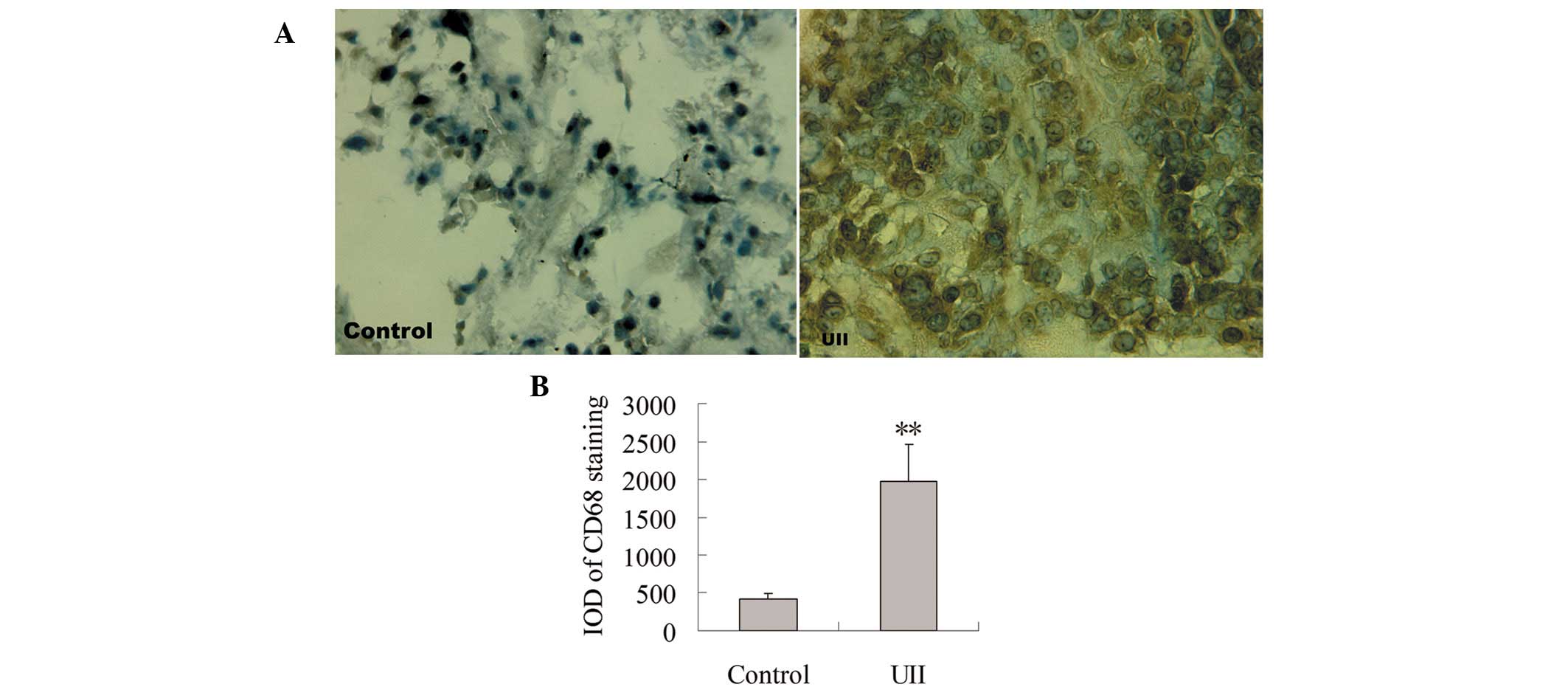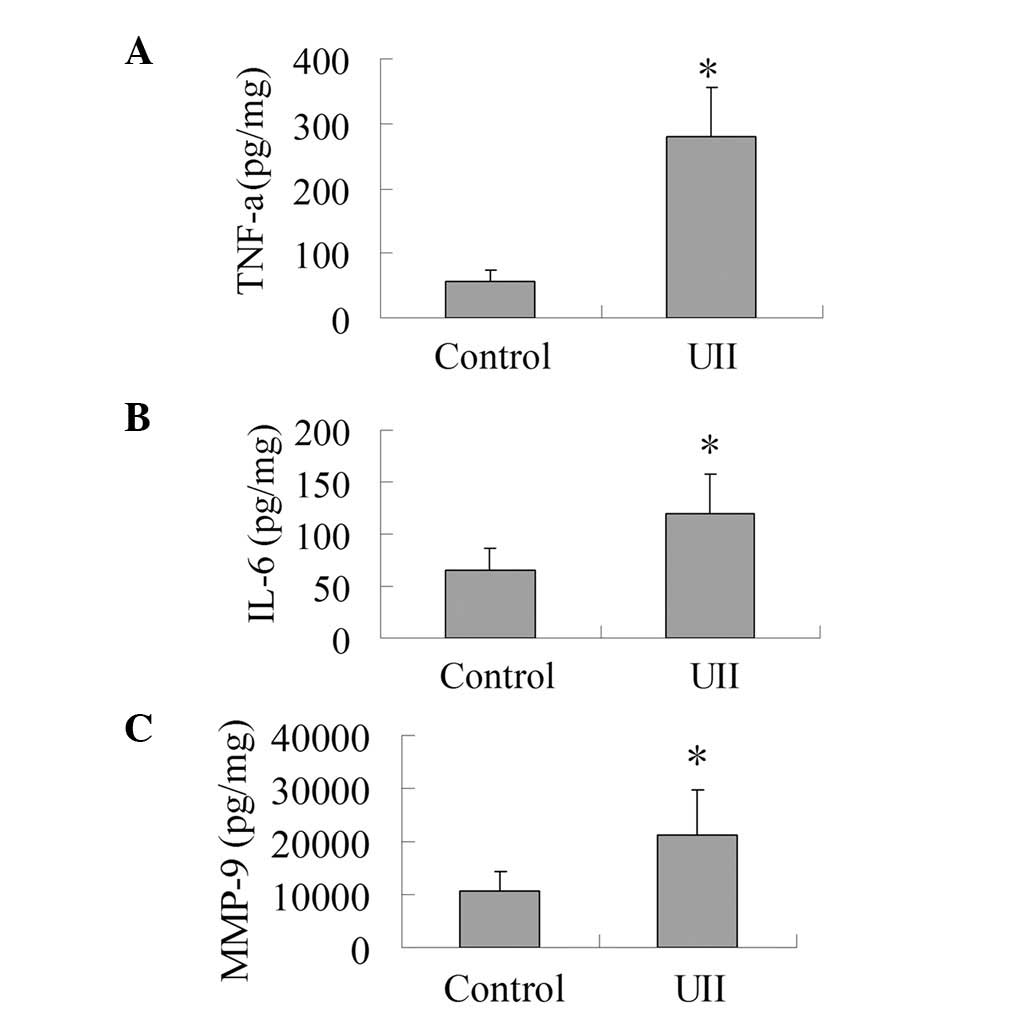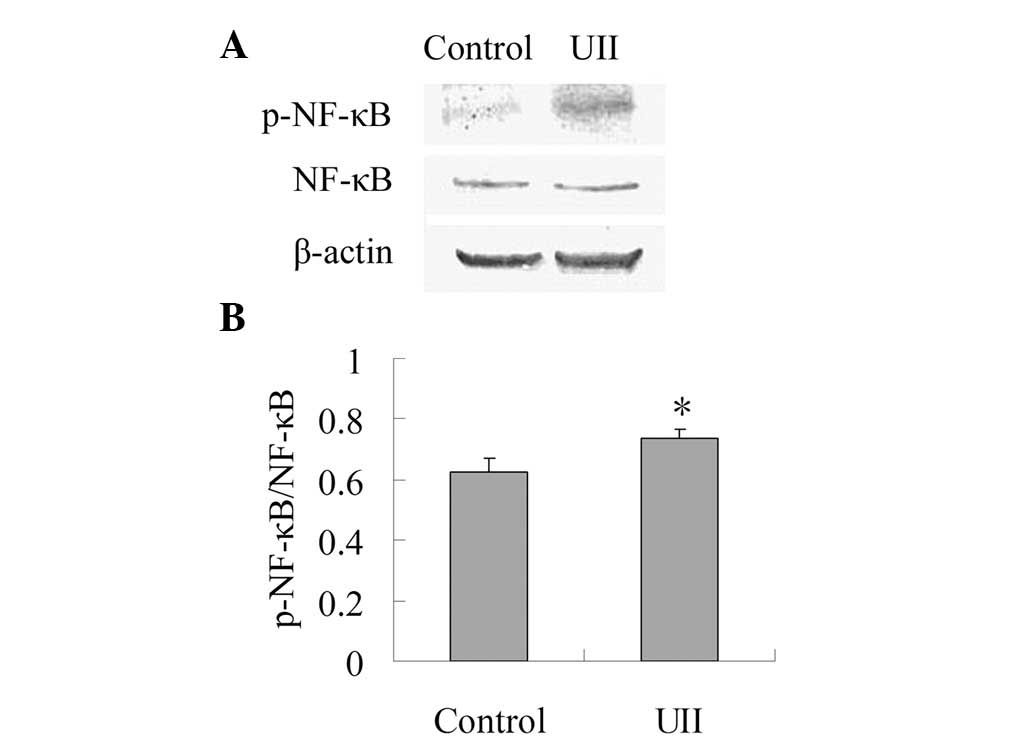|
1.
|
F BalkwillA MantovaniInflammation and
cancer: back to
Virchow?Lancet357539545200110.1016/S0140-6736(00)04046-011229684
|
|
2.
|
TA GondaS TuTC WangChronic inflammation,
the tumor microenvironment and carcinogenesisCell
Cycle820052013200910.4161/cc.8.13.898519550141
|
|
3.
|
J MarxCancer research. Inflammation and
cancer: the link grows
strongerScience306966968200410.1126/science.306.5698.96615528423
|
|
4.
|
LM CoussensZ WerbInflammation and
cancerNature420860867200210.1038/nature0132212490959
|
|
5.
|
JC KangJS ChenCH LeeJJ ChangYS
ShiehIntratumoral macrophage counts correlate with tumor
progression in colorectal cancerJ Surg
Oncol102242248201010.1002/jso.2161720740582
|
|
6.
|
JY LinXY LiN TadashiP DongClinical
significance of tumor-associated macrophage infiltration in
supraglottic laryngeal carcinomaChin J
Cancer30280286201110.5732/cjc.010.1033621439250
|
|
7.
|
T FujiwaraJ FukushiS YamamotoMacrophage
infiltration predicts a poor prognosis for human ewing sarcomaAm J
Pathol17911571170201110.1016/j.ajpath.2011.05.03421771572
|
|
8.
|
H LuW OuyangC HuangInflammation, a key
event in cancer developmentMol Cancer
Res4221233200610.1158/1541-7786.MCR-05-026116603636
|
|
9.
|
WC ChoCK KwanS YauPP SoPC PoonJS AuThe
role of inflammation in the pathogenesis of lung cancerExpert Opin
Ther Targets1511271137201110.1517/14728222.2011.59980121751938
|
|
10.
|
DS O’CallaghanD O’DonnellF O’ConnellKJ
O’ByrneThe role of inflammation in the pathogenesis of non-small
cell lung cancerJ Thorac Oncol520242036201021155185
|
|
11.
|
G LeeTC WalserSM DubinettChronic
inflammation, chronic obstructive pulmonary disease, and lung
cancerCurr Opin Pulm
Med15303307200910.1097/MCP.0b013e32832c975a19417670
|
|
12.
|
T WalserX CuiJ YanagawaSmoking and lung
cancer: the role of inflammationProc Am Thorac
Soc5811815200810.1513/pats.200809-100TH19017734
|
|
13.
|
H TakahashiH OgataR NishigakiDH BroideM
KarinTobacco smoke promotes lung tumorigenesis by triggering
IKKbetaand JNK1-dependent inflammationCancer
Cell178997201010.1016/j.ccr.2009.12.00820129250
|
|
14.
|
CG SlatoreDH AuAJ LittmanJA SatiaE
WhiteAssociation of nonsteroidal anti-inflammatory drugs with lung
cancer: results from a large cohort studyCancer Epidemiol
Biomarkers
Prev1812031207200910.1158/1055-9965.EPI-08-111019293309
|
|
15.
|
A AkhmedkhanovP TonioloA
Zeleniuch-JacquotteKL KoenigRE ShoreAspirin and lung cancer in
womenBr J Cancer874953200210.1038/sj.bjc.660037012085255
|
|
16.
|
D PearsonJE ShivelyBR ClarkUrotensin II: a
somatostatin-like peptide in the caudal neurosecretory system of
fishesProc Natl Acad Sci
USA7750215024198010.1073/pnas.77.8.50216107911
|
|
17.
|
Y CoulouarnI LihrmannS JegouCloning of the
cDNA encoding the urotensin II precursor in frog and human reveals
intense expression of the urotensin II gene in motoneurons of the
spinal cordProc Natl Acad Sci
USA951580315808199810.1073/pnas.95.26.158039861051
|
|
18.
|
NA ElshourbagySA DouglasU ShabonMolecular
and pharmacological characterization of genes encoding urotensin-II
peptides and their cognate G-protein-coupled receptors from the
mouse and monkeyBr J Pharmacol136922200210.1038/sj.bjp.0704671
|
|
19.
|
Y CoulouarnS JégouH TostivintH VaudryI
LihrmannCloning, sequence analysis and tissue distribution of the
mouse and rat urotensin II precursorsFEBS
Lett4572832199910486557
|
|
20.
|
RS AmesHM SarauJK ChambersHuman
urotensin-II is a potent vasoconstrictor and agonist for the orphan
receptor GPR14Nature401282286199910.1038/4580910499587
|
|
21.
|
AP DavenportJJ MaguireUrotensin II: fish
neuropeptide catches orphan receptorTrends Pharmacol
Sci218082200010.1016/S0165-6147(00)01449-810689357
|
|
22.
|
DG JohnsZ AoD
NaselskyUrotensin-II-mediated cardiomyocyte hypertrophy: effect of
receptor antagonism and role of inflammatory mediatorsNaunyn
Schmiedebergs Arch
Pharmacol370238250200410.1007/s00210-004-0980-z15549273
|
|
23.
|
JP SegainM Rolli-DerkinderenN GervoisD
Raingeard de la BlétièreG LoirandP PacaudUrotensin II is a new
chemotactic factor for UT receptor-expressing monocytesJ
Immunol179901909200710.4049/jimmunol.179.2.90117617581
|
|
24.
|
P CirilloS De RosaM PacileoHuman urotensin
II induces tissue factor and cellular adhesion molecules expression
in human coronary endothelial cells: an emerging role for urotensin
II in cardiovascular diseaseJ Thromb
Haemost6726736200810.1111/j.1538-7836.2008.02923.x
|
|
25.
|
N BousetteL PatelSA DouglasEH OhlsteinA
GiaidIncreased expression of urotensin II and its cognate receptor
GPR14 in atherosclerotic lesions of the human
aortaAtherosclerosis176117123200410.1016/j.atherosclerosis.2004.03.02315306183
|
|
26.
|
M Birker-RobaczewskaC BoukhadraR StuderC
MuellerC BinkertO NaylerThe expression of urotensin II receptor
(U2R) is up-regulated by interferon-gammaJ Recept Signal Transduct
Res23289305200310.1081/RRS-12002697214753294
|
|
27.
|
YQ WuZ SongCH ZhouSH XingDS PeiJN
ZhengExpression of urotensin II and its receptor in human lung
adenocarcinoma A549 cells and the effect of urotensin II on lung
adenocarcinoma growth in vitro and in vivoOncol
Rep2411791184201020878108
|
|
28.
|
J ShiD ZhengY LiuMH ShamP TamF FarzanehR
XuOverexpression of soluble TRAIL induces apoptosis in human lung
adenocarcinoma and inhibits growth of tumor xenografts in nude
miceCancer
Res6516871692200510.1158/0008-5472.CAN-04-274915753363
|
|
29.
|
A KawaharaS HattoriJ AkibaInfiltration of
thymidine phosphorylase-positive macrophages is closely associated
with tumor angiogenesis and survival in intestinal type gastric
cancerOncol Rep24405415201010.3892/or_0000087320596627
|
|
30.
|
H KuraharaH ShinchiY MatakiSignificance of
M2-polarized tumor-associated macrophage in pancreatic cancerJ Surg
Res167e211219200910.1016/j.jss.2009.05.02619765725
|
|
31.
|
CH LeeI EspinosaS VrijaldenhovenPrognostic
significance of macrophage infiltration in leiomyosarcomasClin
Cancer Res1414231430200810.1158/1078-0432.CCR-07-171218316565
|
|
32.
|
M RyderRA GhosseinJC Ricarte-FilhoJA
KnaufJA FaginIncreased density of tumor-associated macrophages is
associated with decreased survival in advanced thyroid cancerEndocr
Relat Cancer1510691074200810.1677/ERC-08-003618719091
|
|
33.
|
A SicaRole of tumour-associated
macrophages in cancer-related inflammationExp
Oncol32153158201021403610
|
|
34.
|
BB AggarwalS ShishodiaSK SandurMK PandeyG
SethiInflammation and cancer: how hot is the link?Biochem
Pharmacol7216051621200610.1016/j.bcp.2006.06.02916889756
|
|
35.
|
J SunRD RamnathL ZhiR TamizhselviM
BhatiaSubstance P enhances NF-kappaB transactivation and chemokine
response in murine macrophages via ERK1/2 and p38 MAPK signaling
pathwaysAm J Physiol Cell
Physiol294C15861596200810.1152/ajpcell.00129.200818434625
|

















